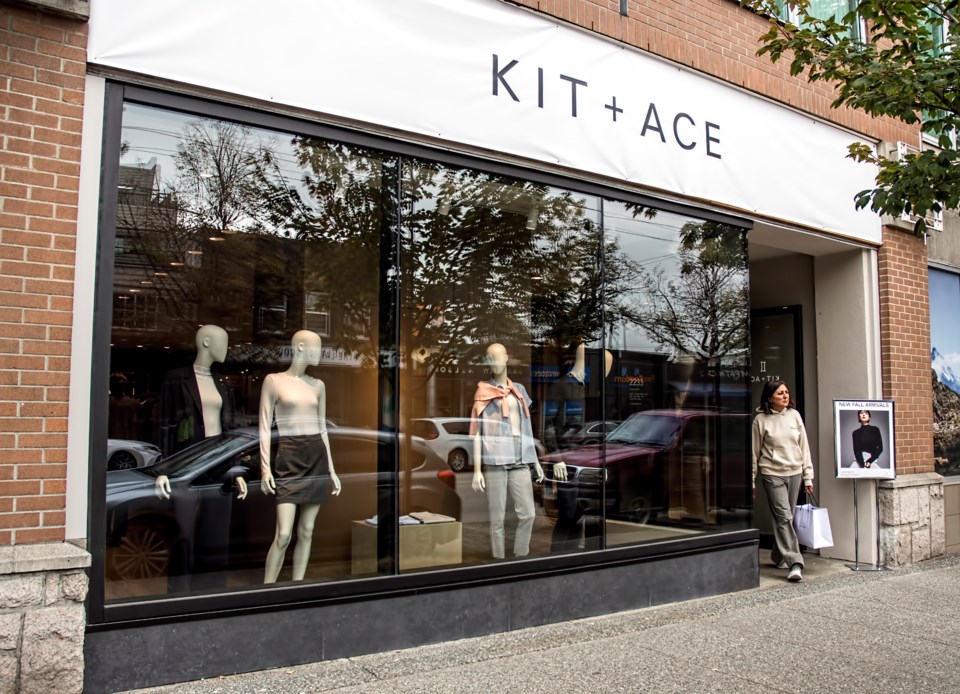When it comes to Vancouver’s streetfront retail scene, West 4th Avenue stands out.
Robson Street is known for its global brands with larger stores. Alberni Street is famous for its luxury retailers.
West 4th Avenue has become known for up and coming, smaller retailers—often those that are higher end, and sell durable and fashionable clothing, outdoor-wear and travel essentials.
It is also known as a place where larger global companies test new store banners, or their first stores in North America.
Asian luggage seller Lojel, for example, last month opened its first North American store, at 2183 West 4th Avenue. The store is run like a small business given that the company runs its North American operations as a separate division, with a corporate office in Vancouver, Lojel’s North American general manager Rachel Draper told BIV.
Her chain has about 30 other stores around the world, and she plans to open a second Canadian location in Montreal next year, she said. After that, stores south of the border are possible, she added.
Lojel’s entrance followed shoemaker .
In late 2022, German sportswear giant , at 2235 West 4th Avenue.
That Terrex store enabled Adidas to , and prompted Arc'Teryx to launch a . Arc'Teryx .
Being a test location for an eventual uber-successful company comes natural for West 4th Avenue, given that Lululemon Athletica Inc. (Nasdaq:LULU) in 1998 opened its first store, at 2101 West 4th Avenue.
That location closed, but —something that amplified interest from many retailers in locating on the strip, said Marcus and Millichap senior vice-president Martin Moriarty.
Lululemon also has a second store immediately west of its original location.
“A lot of retailers have seen West 4th as a great demographic,” Moriarty said. “It’s a busy street close to the beach, close to UBC (University of British Columbia) and close to downtown.”
At least one large redevelopment is in the planning stages.
A $90 million deal this summer involved land selling at 2315 West 4th Avenue, where a Safeway has operated for 56 years, at the corner with Vine Street. New owners Low Tide Properties and PCI bought the land and plan to construct a mixed-use building.
Immediately east of that site, at 2211 West 4th Avenue, , including 68,332 square feet of leasable space on the first and second floors of a building on the north side of West 4th Avenue for a price that was “in the realm of $100 million-plus.”
That block includes retailers such as a Whole Foods Market and an Arc’Teryx.
New retailers are opening.
Helly Hansen, for example, opened a new store at 2231 West 4th Avenue on October 16. Future retailers set to open on West 4th Avenue include Aritzia at 2199 West 4th Avenue.
“They’re in possession of the space and they’re undertaking their renovations,” Moriarty said.
Not all businesses are doing well.
Romer's owner Kelly Gordon told BIV that he plans to permanently close his 14-year-old original location at 1873 West 4th Avenue on Oct. 27 because guest counts have declined and renewing his lease would result in an unsustainable rent hike. He opened a new Romer's in Lynn Valley this spring and he plans early next year to open a Romer's at Â鶹´«Ã½Ó³»International Airport, in the U.S. departures area.
Small businesses succeed on West 4th Avenue
When up-and-coming Vancouver-based luggage seller , CEO Victor Tam saw the launch as being the first of many.
He founded the company in spring 2018, , he said.
Tam had a background designing items and selling them online, so he called on friends he had known since childhood—Hubert Chan and Daniel Shin—to join him building a new venture selling luggage online.
Monos generated about US$1 million in sales in the last half of 2019, Tam said. It then increased sales by more than 300 per cent annually in each of 2020 and 2021. Tam told BIV that Monos’ sales in 2022 topped US$75 million. In 2023 sales jumped to around US$150 million, he added.
Tam said he anticipates that 2024 revenue will be in the US$200 million range.
“It’s hard to tell because about 50 per cent of our revenue comes in the last three months of the year,” he said.

Monos CEO Victor Tam opened his Vancouver-based company’s first permanent store at 2131 West 4th Avenue last year. | Rob Kruyt, BIV
While the lion’s share of revenue comes from online sales, Monos also has a store is in Toronto. It has signed six leases to open stores in 2025: A second Toronto store, and ones in Los Angeles, Chicago, Boston, New York and Washington, D.C., Tam said.
“We chose those locations because that’s where a lot of our online sales are coming from,” he said.
Monos in September 2022 raised US$30 million in a financing round led by Venn Growth Partners, with participation from Strand Equity and Michele Romanow, Tam said.
This was on top of a US$10 million financing round in December 2021, which also involved Venn Growth Partners and Strand Equity, he added.
Combined, those rounds bought a significant minority stake in the company, Tam said.
Kit and Ace, another smaller retailer with big dreams, .
CEO David Lui told BIV that the location was ideal because it is in the heart of a shopping strip with many fashion retailers.
He said he cancelled plans to open a few stores this year because he decided that the locations were not strong enough.
Kit and Ace’s clothing has “timeless technical fashion,” Lui said, because it has designs that make it comfortable to wear and easy to maintain.
“We’re not chasing fads,” Lui explained.




